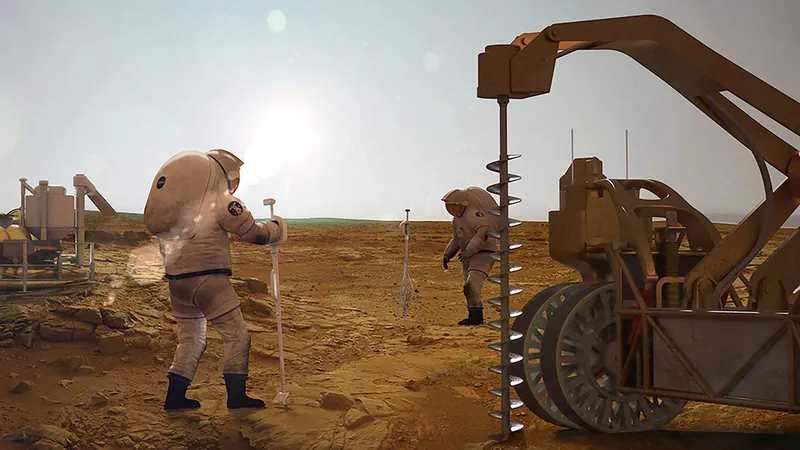
Is the U.S. Losing Mars Leadership to China's Ambitious Sample Return Mission?
2025-06-30
Author: Sarah
As NASA's Mars Sample Return (MSR) initiative grapples with political and financial woes, China is charging ahead with its own plans for the Red Planet.
New revelations detail China's Tianwen-3 mission, aiming to retrieve an impressive haul of Martian rock and soil. Scheduled for launch in 2028, this mission could deliver around 500 grams of extraterrestrial treasures back to Earth by 2031. The mission's lander is equipped with a drill designed to reach depths of 6.5 feet (2 meters) to collect subsurface samples, and it will also use a robotic arm to gather over 400 grams of material from the surface. Additionally, a robotic helicopter will be deployed for sampling rocks located more than 300 feet from the lander.
The Stakes of Sample Return
The implications of China's success with its Mars sample return are sparking discussions in the U.S. Mars samples are not only critical for scientific exploration but also play a major role in planning future human missions to the planet.
China is set to evaluate 86 potential landing sites, ultimately selecting one that favors the discovery and preservation of evidence for past or present life on Mars, as detailed in a paper published in Nature Astronomy. Lead author, Zengqian Hou, emphasizes that the mission seeks insights into life on Mars, outlining precise strategies for sample collection and analysis.
Yiliang Li, an astrobiologist from the University of Hong Kong, leads efforts to determine optimal landing zones. Key locations include areas where liquid water likely existed in Mars' past, rich in essential nutrients and potentially preserving microbial activity for eons. Li's team continues an active search for promising sampling sites.
U.S. Budget Cuts and Space Race Implications
Meanwhile, the U.S. faces significant hurdles. President Trump's 2026 funding request aims to eliminate financially overextended programs, including MSR. The White House argues that the mission, now estimated at $11 billion, is both too costly and off schedule, with samples not expected to return until 2040.
As the debate over funding rages, NASA's Perseverance rover, operational in Jezero Crater since 2021, continues its crucial work of collecting potential signs of ancient life. These sealed samples are primed for delivery to Earth and could represent invaluable data.
A New Space Race?
The cancellation of NASA's collaboration with the European Space Agency has led some experts to declare that the U.S. is effectively ceding its leadership in planetary exploration to China. Senator Ted Cruz has proposed a $10 billion investment to ensure the U.S. maintains supremacy in space exploration, including funding for a Mars Telecommunications Orbiter, aimed at supporting future missions.
However, challenges loom over whether China can access the high-value samples already collected by Perseverance. Experts like Steve Ruff argue that technical limitations of China's mission will prevent them from retrieving these specific samples.
Opportunities for Cooperation?
Despite the competitive landscape, Chinese researchers, including Zengqian and his team, are advocating for global collaboration in Martian exploration. But geopolitical tensions complicate potential partnerships. Some experts are urging a focus on in-situ life detection instruments to guarantee astronaut safety before humans venture to Mars.
Safeguarding Earth from Martian Discoveries
China plans to establish a specialized facility in Hefei to conduct rigorous testing on any Martian materials before they are shared with the global scientific community. This precaution aims to mitigate risks posed by any potentially active biological agents those samples might contain.
The Race for Martian Knowledge
As the clock ticks on ambitious interplanetary missions, the battle for Martian knowledge wages on. The Mars Exploration Program Analysis Group emphasizes that the U.S. must not lose its leading position in deep space exploration to other nations, particularly China, as both countries vie for pioneering accomplishments.
With the future of Mars exploration hanging in the balance, which nation will ultimately secure its place in history?





 Brasil (PT)
Brasil (PT)
 Canada (EN)
Canada (EN)
 Chile (ES)
Chile (ES)
 Česko (CS)
Česko (CS)
 대한민국 (KO)
대한민국 (KO)
 España (ES)
España (ES)
 France (FR)
France (FR)
 Hong Kong (EN)
Hong Kong (EN)
 Italia (IT)
Italia (IT)
 日本 (JA)
日本 (JA)
 Magyarország (HU)
Magyarország (HU)
 Norge (NO)
Norge (NO)
 Polska (PL)
Polska (PL)
 Schweiz (DE)
Schweiz (DE)
 Singapore (EN)
Singapore (EN)
 Sverige (SV)
Sverige (SV)
 Suomi (FI)
Suomi (FI)
 Türkiye (TR)
Türkiye (TR)
 الإمارات العربية المتحدة (AR)
الإمارات العربية المتحدة (AR)